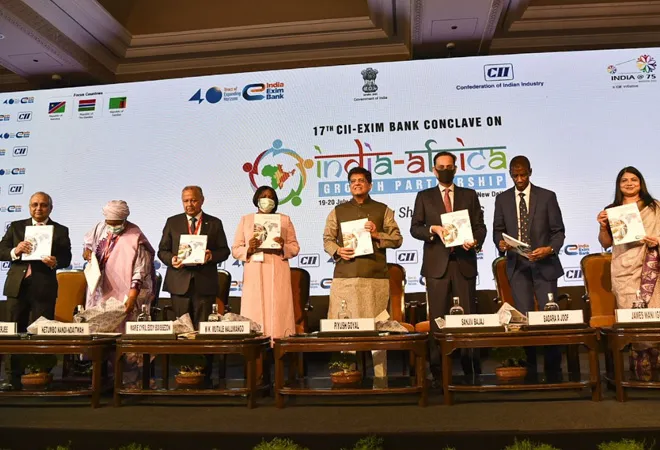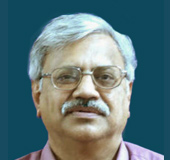
The
CII-EXIM Bank Conclave on India–Africa Project Partnership was launched with the support of the Ministry of External Affairs (MEA) and Ministry of Commerce and Industry (MCI) of the Government of India in 2005 and was later rechristened as the India-Africa Growth Partnership. The 17
th CII-EXIM Bank Conclave on India Africa Growth Partnership held in New Delhi on the 19 and 20 July 2022 was attended by the Vice Presidents of Gambia, Zambia and Mauritius. Besides, The Vice President, Venkaiah Naidu, Minister of External Affairs, S. Jaishankar, and Minister of Trade, Piyush Goyal were joined by
40 ministers from 17 countries in Africa. The conclave offered an opportunity to policymakers, bureaucrats, and captains of business and industry to review Indo-African Growth Partnership in perspective.
Conclave in a new context
The summit was held on the account of the reduced severity of COVID-19 as well as in the midst the ongoing of Russo–Ukraine war since February 2022. While the havoc wreaked by COVID-19 across the world sensitised the participants towards the fragile health infrastructure in different parts of the world, the Russo-Ukraine war sharply drove home the problems related to food and energy security. The war also underscored how tensions in one geographical space can grip almost the entire world and drag it into the throes of crises.
The conclave offered an opportunity to policymakers, bureaucrats, and captains of business and industry to review Indo-African Growth Partnership in perspective.
Similarly, it became equally evident that the entire project needs to be visualised in a new context because since
January 2021, the AfCFTA, as a continental trading area, is in place. Moreover, there are several significant areas where the Indo-African development cooperation is likely to grow such as agriculture, pharmaceuticals, healthcare, digital and physical infrastructure, education, skills and capacity building, start-ups, International Solar Alliance (ISA), IT, banking, oil and gas, mining, textiles, etc. India’s public as well as private sector companies can play a pivotal role in these cooperative endeavours. Under the circumstances, the deepening of Indo-African trade can certainly facilitate growth, investment, and employment opportunities in India and Africa.
Trade and investments
Just before COVID-19 shook the world, the Indo-African trade ties were flourishing as India had emerged as the
fourth largest trading partner of Africa with trade worth
US$ 69 billion in the financial year 2018-19. India was going to open up additional 18 diplomatic missions in Africa to take the total number of embassies up to 47. So far, India has a diplomatic footprint in 43 African countries. Surprisingly, by 2020-21 India’s trade with Africa rose to
US$ 89.5 billion compared to US$ 56 billion in the previous year. According to Piyush Goyal, the trade between India’s trade with Africa is fairly
balanced with exports of trade and services of US$ 40 billion and imports of trade and services of US$ 49 billion. According to S. Jaishankar, India’s cumulative investments in Africa from 1996–2021 have been
US$ 73 billion making it among the top five investors in Africa. India also has extended the
Duty-Free Tariff Preference (DFTP) scheme in Africa allowing duty-free access to 98.2 percent of the total tariff lines which has also allowed
33 countries to gain further benefits. In its turn, India has opened its market to Africa. Visits of high-level dignitaries have been cementing the Indo-African ties. During the past eight years, there were 36 such visits from the Indian side while 100 visits from the African side. In addition, the medium of the India–Africa Forum Summit (IAFS) held in 2008, 2011, and 2015, respectively, has facilitated Indo-African development cooperation. India has extended
US$12.3 billion as a concessional loan to Africa. It is also engaged in development-related projects in Africa.
Under the circumstances, the deepening of Indo-African trade can certainly facilitate growth, investment, and employment opportunities in India and Africa.
Status of India’s projects in Africa
So far, India has completed
197 projects, while 65 projects are under execution and 81 are in the pre-execution stage. Further, India has also given US $
700 million grant assistance to Africa. The scope of such projects is vast including water schemes, rural solar electrification, irrigation, transmission lines, power plants, cement, sugar and textile factories, railway infrastructure, technology parks, etc. In the context of Africa, in July 2018, Prime Minister
Modi spelt out 10 principles in his address to the Ugandan Parliament at Kampala that has guided India’s African policy in diverse domains of cooperation. It needs to be underlined that during the emergency conditions of COVID-19, India extended help to
32 African countries by giving
150 tonnes of medical assistance.
India out of its development package for other countries gives
grants worth US$ 1 billion and a
line of credit worth US$ 4 billion every year. Over the years, India has funded projects and enjoyed a significant symbolic presence in Africa. Just to cite a few instances, in the Gambia India has not merely built
National Assembly Building but undertaken projects related to water supply, agriculture, and food processing. It is also building the presidential palace in
Ghana, the first milk factory in
Djibouti and power projects in
Sudan and Rwanda.
Just to cite a few instances, in the Gambia India has not merely built National Assembly Building but undertaken projects related to water supply, agriculture, and food processing.
In the recently concluded 17
th summit some sessions were country-specific and involved countries such as
Namibia, Mauritius, and Gabon. Namibia is rich in resources like uranium, copper, diamonds, and phosphates. In Namibia, India is building an
IT centre of excellence. On the side-lines of the present summit, India has already
signed three MoUs with Namibia concerning wildlife conservation and sustainable bio-diversity utilisation, gainful employment for spouses and dependents of embassy staff and one MOU between the National Forensic Science University (NFSU) of India and Namibian Police Forensic Science Institute (NPFSI). Moreover, India treats Mauritius as a gateway to Africa as it is the only country which has a Comprehensive Economic Cooperation Partnership Agreement
(CECPA) with India. Some of the significant Indian projects in Mauritius such as the
Metro Express, the new
Supreme Court building, and
social housing have been seen. Similarly, the oil-rich state of
Gabon is looking forward to enhancing ties with India after India’s Vice President, V. Naidu, visited that country in May 2022.
Capacity building and humanitarian assistance
India has not lost sight of promoting skill development and capacity building in Africa. In fact, during the third
IAFS meet of 2015, India announced 50,000 scholarships to African students that wanted to pursue studies in India. Out of these,
32,000 scholarships have already been utilised, albeit, the implementation of this programme appears a bit tardy, owing to the pandemic. Nevertheless, India has been consistently training African students as well as officials under the Indian Technical and Economic Cooperation (ITEC) programme since its inception in 1964. To promote interactions with Africa through digital tools, India has also launched the second phase of the
Pan African e-network through
e-Arogya Bharati and e-Vidya Bharati networks in 2019. The former provides free medical education to 1,000 doctors/nurses/paramedics and free medical services to African countries through telemedicine while the latter aims at providing 4,000 students free tele-education for five years. Under these initiatives,
youth from 19 African countries have enrolled in various diploma and degree courses. India is also helping Africa’s digital transformation through
IT centres, science and technology parks and entrepreneurship development centres.
India-Africa development cooperation is growing constantly in diverse spheres. By now a mélange of public sector and private sector enterprises associated with India have spread their networks in Africa.
In addition, India has provided
help and relief assistance through Sahayata to cyclone-hit Mozambique in 2019. In 2020,
Operation Vanilla provided relief to flood victims in Madagascar and offered technical support to
Mauritius in containing the oil spill due to the grounding of the Japanese ship, Wakashio.
Concluding remarks
Briefly, India-Africa development cooperation is growing constantly in diverse spheres. By now a mélange of public sector and private sector enterprises associated with India have spread their networks in Africa. For instance, public sector companies such as ONGC Videsh, Gujarat State Petroleum Corporation, Oil India, and Indian Railways co-exist with private companies like Reliance, Tata Africa Holdings, Airtel, Godrej, Arcelor Mittal, etc. through partnerships in Africa. There is a great deal of scope to enhance the India-Africa Growth Partnership with efficient and timely implementation of all the programmes underway. For instance, constant coordination between the MEA, and the MCA through the CII-EXIM Bank can deliver even better results. Similarly, an enhanced degree of coordination within the EXIM Bank between its headquarters in Mumbai and its local offices in Johannesburg (South Africa), Addis Ababa (Ethiopia), and Abidjan (Cote d’Ivoire) on the processes and issues related to the lines of credit can further galvanise the Indo-African partnership. Furthermore, Indians have to be more sensitive toward the issues related to race and racial discrimination when African students and officers come for training in India and when Indian employers handle African employees in Africa.
The views expressed above belong to the author(s). ORF research and analyses now available on Telegram! Click here to access our curated content — blogs, longforms and interviews.



 The
The  PREV
PREV


